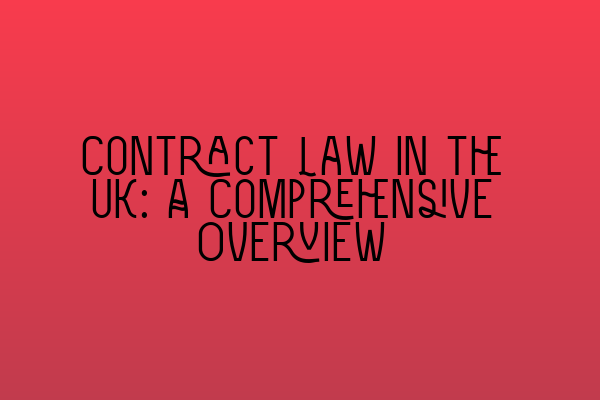Contract Law in the UK: A Comprehensive Overview
Welcome to our comprehensive guide to contract law in the UK. Whether you’re a law student preparing for the SQE exams or a professional looking to refresh your knowledge, this article aims to provide you with a thorough understanding of the key principles and concepts of contract law. So let’s dive in!
What is a Contract?
A contract is a legally binding agreement between two or more parties. It can be a written or verbal agreement, although written contracts are generally considered more reliable in a court of law. To be enforceable, a contract must meet certain criteria:
- Offer and Acceptance: One party must make an offer, and the other party must accept that offer.
- Intention to Create Legal Relations: Both parties must intend to create legal relations.
- Consideration: There must be an exchange of something of value, known as consideration.
- Capacity: The parties entering into the contract must have the legal capacity to do so (e.g., they must be of sound mind and age).
Now that we’ve covered the basic elements of a contract, let’s explore some common types of contracts and their characteristics.
Types of Contracts
1. Express Contracts: These contracts are explicitly stated in writing or verbally. They clearly outline the terms and conditions agreed upon by the parties.
2. Implied Contracts: These contracts are not explicitly stated but are formed by the actions or conduct of the parties involved. Implied contracts are based on the principle of “implied consent.”
3. Unilateral Contracts: In a unilateral contract, one party makes a promise in exchange for a specific action or performance from the other party. The contract is formed once the action is completed.
4. Bilateral Contracts: Bilateral contracts involve an exchange of promises between two parties. Both parties are bound to perform their respective obligations under the contract.
5. Void Contracts: Void contracts are not legally valid from the beginning. They lack one or more essential elements necessary for enforceability.
6. Voidable Contracts: Unlike void contracts, voidable contracts are initially valid but can be voided by one of the parties due to certain legal reasons, such as fraud or misrepresentation.
These are just a few examples of the different types of contracts that exist in contract law. It’s important to understand the specific characteristics of each type when dealing with contract-related matters.
Elements of a Contract
For a contract to be legally binding, it must contain certain essential elements. Let’s take a closer look at these elements:
- Offer: The offer is a clear and definite proposal made by one party to another.
- Acceptance: Acceptance is the unqualified agreement to the terms of the offer. Both parties must agree on the terms without any modifications.
- Consideration: As mentioned earlier, consideration refers to something of value exchanged between the parties. It can be in the form of money, goods, services, or even a promise to do or not to do something.
- Intention to Create Legal Relations: In order for a contract to be valid, the parties must intend to create a legally binding relationship. Contracts between family members or friends may not always carry this intention.
- Capacity: The parties entering into a contract must have the legal capacity to do so. This means they must be of sound mind, not intoxicated, and of a certain age (18 years old in the UK).
- Consent: Consent refers to the agreement of the parties involved. If consent is obtained through duress, fraud, or misrepresentation, the contract may be voidable.
- Legality: A contract must have a lawful purpose and cannot involve illegal activities or go against public policy.
Understanding these elements is crucial for assessing the validity and enforceability of a contract.
Termination of Contracts
Contracts can be terminated in several ways:
- Performance: If both parties fulfill their obligations, the contract is considered discharged through performance.
- Agreement: The parties can mutually agree to terminate the contract before the obligations are fulfilled. This is known as rescission.
- Breach: When one party fails to perform their obligations without a valid excuse, the other party may consider the contract breached and pursue legal remedies.
- Frustration: A contract may be frustrated if an unforeseen event occurs, making it impossible to fulfill the contract’s purpose. In such cases, the contract becomes impossible to perform and may be terminated.
Now that we have covered the fundamentals of contract law, you may be wondering how to prepare for the SQE exams or deepen your understanding of contract law. We have got you covered with our comprehensive online courses tailored specifically for SQE 1 and SQE 2 preparation.
If you’re getting ready for SQE 1, make sure to check out our SQE 1 Practice Exam Questions and SQE 1 Practice Mocks FLK1 FLK2 to test your knowledge and improve your performance on the exam.
For SQE 2 preparation, we offer comprehensive courses designed to help you master the essential topics and skills required for success in the exam. You can find more information about our SQE 2 Preparation Courses on our website.
Stay updated with the latest SRA SQE exam dates by visiting our article on SRA SQE Exam Dates.
We hope this comprehensive overview has provided valuable insights into contract law in the UK. Remember to consult legal professionals for specific cases or seek additional guidance if needed. Good luck with your studies and future legal career!
